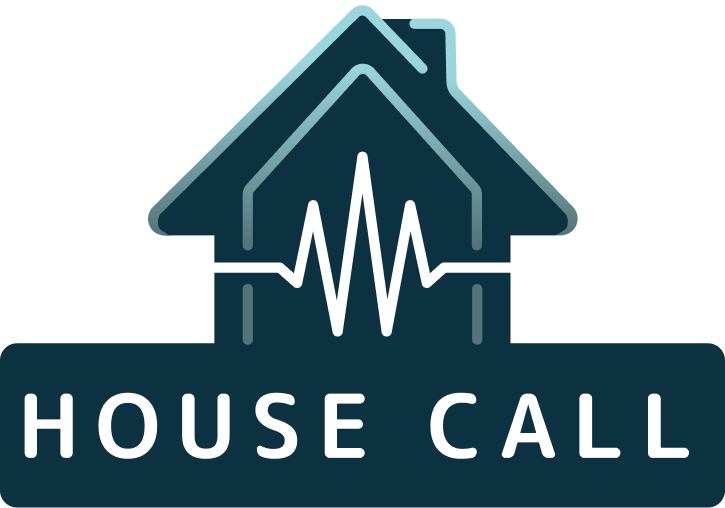When To Call A Nurse vs. A Doctor For Home Health Care
In an age where convenience is king, it’s no surprise that healthcare is moving beyond the confines of traditional clinics and hospitals. Whether you’re balancing a busy schedule, managing a chronic condition, or simply looking for a more comfortable way to receive care, in-home healthcare offers a modern, flexible solution.
But how do you know when it’s the right choice for you or a loved one? And more importantly, how do you determine whether you need a nurse, doctor, or advanced practitioner to meet your needs?
Let’s walk through some signs that in-home healthcare may be the ideal option and explain when it may be best to call a nurse versus a doctor.
What Is In-Home Healthcare?
In-home healthcare is exactly what it sounds like—receiving medical services from licensed professionals right in the comfort of your own home. It’s a tailored approach to wellness that prioritizes your convenience, comfort, and unique health needs.
Through platforms like House Call The App, you can connect with skilled providers for a wide range of services, including:
- Routine Care: Wellness check-ups, vital sign monitoring, patient education.
- Chronic Illness Management: Regular monitoring and adjustments for conditions like diabetes, hypertension, or COPD.
- IV Therapy and Hydration: Safe and effective administration of fluids, medications, or vitamins.
- Post-Surgical Recovery: Monitoring healing progress, wound care, and pain management after surgery or hospital discharge.
- Age-Related Conditions: Elderly patients managing arthritis, dementia or mobility issues can receive medical and daily living support.
Signs You May Benefit from In-Home Healthcare
So, how do you know if in-home healthcare is the right choice for you? Here are some common scenarios where it might be the perfect fit:
- Difficulty Traveling to Clinics or Hospitals: Whether due to mobility issues, lack of transportation, or simply a hectic lifestyle, in-home care eliminates the hassle of travel.
- Chronic Conditions Requiring Regular Monitoring: Conditions like diabetes or COPD or heart failure often require consistent monitoring to stay under control. In-home visits can provide that ongoing support.
- Post-Procedure Care or Recovery: Healing from surgery or a hospital stay can be stressful. Having a provider come to you makes recovery smoother and less disruptive.
- Desire for Preventative Care in a Comfortable Setting: Regular wellness check-ups and preventative screenings are easier to manage when they happen in your own space.
- Busy Lifestyle: When your schedule doesn’t leave much room for waiting rooms and long commutes, in-home care offers a practical solution.
Knowing when to choose in-home care is the first step. But knowing which provider to call—nurse, doctor, or advanced practitioner—is just as important.
When to Call a Nurse vs. When to Call a Doctor or Advanced Practitioner
Navigating in-home healthcare starts with understanding which type of provider best suits your needs. While nurses, doctors, and advanced practitioners (like nurse practitioners or physician assistants) all play critical roles, their expertise and scope of practice differ.
Here’s how to decide:
When to Call a Nurse
Nurses are skilled healthcare professionals trained to provide a wide range of services that often make them the ideal choice for in-home visits. You might want to call a nurse when you need:
- Routine Check-Ups and Monitoring: Regular assessments of blood pressure, blood sugar, heart rate, and other vital signs.
- Medication Administration: Giving injections, managing IV therapy, or ensuring medication adherence.
- Wound Care and Dressing Changes: Especially useful post-surgery or following an injury.
- Patient Education and Support: Providing guidance on managing chronic conditions, dietary advice, or general health maintenance.
- IV Therapy and Hydration: Administering fluids or medications safely and effectively from home.
In many cases, nurses serve as the front line of care, providing consistent monitoring and addressing issues before they escalate. They also collaborate with other healthcare providers to ensure your care plan is on track.
When to Call a Doctor or Advanced Practitioner
While nurses excel at providing routine and supportive care, there are times when you need the expertise of a doctor or advanced practitioner. Consider calling a doctor or advanced practitioner when you need:
- Diagnosis of New Symptoms or Conditions: If you’re experiencing unfamiliar symptoms, a physician or advanced practitioner can evaluate your condition and recommend appropriate tests or treatments.
- Prescription and Medication Adjustments: While nurses can administer medication, only doctors or advanced practitioners can prescribe or adjust medications.
- Advanced Assessments: For complex or rapidly changing conditions that require more in-depth evaluation.
- Chronic Illness Management: When your treatment plan requires modification or more specialized oversight.
- Emergency Evaluation: If your symptoms are severe, persistent, or worsening, it’s time to involve a higher level of expertise. Remember, your home is not a substitute for an emergency room.
Doctors bring a depth of training and specialization that makes them essential for diagnosing complex conditions, developing comprehensive treatment plans, and handling medical complications. They often have expertise in a particular field, such as cardiology or neurology, which may be necessary depending on your condition.
Advanced practitioners like nurse practitioners and physician assistants, provide some of the same services as doctors, including diagnosing conditions, prescribing medications, and managing comprehensive treatment plans. While their scope of practice can vary by state regulations, they are highly skilled professionals dedicated to providing comprehensive, patient-focused care.
How House Call The App Simplifies the Process
Knowing which type of provider to call can be challenging, but that’s where House Call The App shines. The platform allows you to easily choose from a range of healthcare professionals who skills and expertise fit your needs. Whether you require routine monitoring from a nurse or a comprehensive assessment from a physician, House Call makes the process simple and accessible.
With just a few taps, you can:
- Browse qualified providers and their specialties.
- Identify your specific service needs
- Schedule appointments that fit your lifestyle.
The convenience and flexibility of House Call gives you access to the right level of care when you need it most.
Choosing in-home healthcare is about more than just convenience—it’s about making informed decisions that fit your lifestyle, personal preferences and health needs. Whether you need rehabilitation services, routine monitoring, or chronic illness management, having access to a network of skilled professionals brings peace of mind and a higher quality of care.
With House Call The App, you can easily find the right provider—whether it’s a nurse, advanced practitioner, or doctor—who can offer the level of care you need. This flexible, patient-centered approach empowers you to take control of your wellness journey from the comfort of your own home.
As healthcare continues to evolve, in-home services are paving the way for a more accessible, personalized, and effective model of care. Whether you’re managing a chronic condition, recovering from an illness, or simply looking for a convenient way to stay on top of your health, House Call The App makes it easier than ever to connect with the professionals you need.
Doctor vs. Nurse FAQs
1. What services can nurses provide during an in-home visit?
Nurses can assist with routine monitoring, medication administration, wound care, patient education, and IV therapy. They are invaluable for ongoing care and support, particularly when consistency and accessibility are essential.
2. When should I consider calling a doctor instead of a nurse?
You should call a doctor if you need a diagnosis, have complex or worsening symptoms, require medication prescriptions or adjustments, or need specialized assessments and treatment plans.
3. How does House Call The App help me find the right provider?
House Call The App allows you to browse skilled providers, schedule appointments, and communicate with your care team—all from the convenience of your phone. It helps match you with the appropriate level of care based on your needs.
4. Is in-home healthcare covered by insurance?
Coverage varies depending on your insurance plan and the type of care you require. It’s best to check with your insurance provider to see what services may be covered.
5. What if I need both a nurse and a doctor—can I coordinate that through the app?
Absolutely. House Call The App is designed to make healthcare coordination simple. You can schedule visits with different providers as needed to ensure comprehensive, integrated care.
References
- Accenture. 2020. “Health Provider Loyalty.” https://www.accenture.com/content/dam/accenture/final/accenture-com/document-2/Health-Provider-Loyalty-Accenture.pdf.

 Login
Login
4 replies on “When To Call A Nurse vs. A Doctor”
[…] In-home care by nature allows healthcare providers to spend more time with you. This means appointments are not just about treating a condition but understanding your lifestyle and tailoring treatments to suit your individual needs. As Dr. Medina noted, “you get more of that one-on-one” time with the nurse or doctor, and “it’s not as rushed.” This one-on-one attention ensures that care is comprehensive, considerate, and deeply personalized […]
[…] of them as the superheroes of the healthcare world—tested, regulated, and (usually) requiring a doctor’s approval before you can get your hands on them. They contain active pharmaceutical ingredients […]
[…] workflows, freeing clinicians to focus on what really matters: people. It’s often the in-home provider who notices the unopened meds on the counter or the patient too fatigued to answer the […]
[…] Recognizing when to call a home nurse can ensure timely and effective care: […]